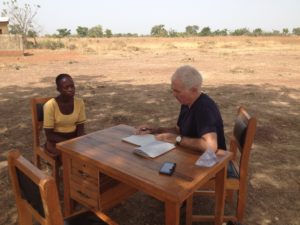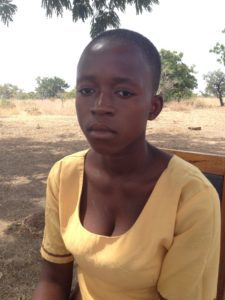I’m sitting across a table from Jennifer, a diminutive and solemn 14 year old student at Gombele Junior High School. The table has been placed under a tree a little distance from the school buildings to ensure our conversation is private. Jennifer is amongst a small group of students who I am interviewing to gather information about the lives of the students in this community.
Gombele Junior High School has been selected by ATE Ghana to be the next school in their school feeding programme. Each student at the school will receive a meal each day, cooked by local volunteers in a kitchen built by the local community. Farmers from the area will have produced the ingredients for the food, and ATE Ghana will pay the farmers for their product. As well as interviewing the students I am here to gather statistics about the students such as their weight, height and attendance record before the feeding programme starts.
On Monday and Tuesday of this week I gathered statistics and today is Wednesday and I’m interviewing the students. Jennifer is telling me her story.

Jonathan with Jennifer
Jennifer says she used to live with her mother, father, brothers and sisters, down in the south of Ghana but some time ago she was sent north alone to Gombele to look after her grandfather and to cook and clean for him. On schooldays she bicycles to school, it takes her two and a half hours to cycle to school and two and half hours to cycle home. Jennifer says she never eats breakfast before she sets off. (Later I learn from the other students that none of them ever eat breakfast). Jennifer eats no food at school, and when she gets home she eats a meal if there is enough food in the house. Often there isn’t enough food as her family in the south have been unable to send money. Today is Wednesday, Jennifer hasn’t eaten since Monday.
I also meet Gabriel who tells me he walks an hour to school each day. Again he eats no breakfast and no lunch. His parents are farmers who take the produce to the nearby Babile market each Saturday. There they make enough money to be able to feed the family an evening meal for the following few days, but by Wednesday or Thursday the money has run out so the family go hungry.
During the course of the day I speak with the other students. The cases of Jennifer and Gabriel are not isolated; in fact they are the norm. Later I speak with the teachers who tell me, unsurprisingly, that the children are withdrawn and unable to concentrate after midday. ‘When I come to school and I didn’t eat I don’t understand the teachers’, student Angelina tells me.
On Friday I visit a different school. Dowine Junior High School has been in the ATE feeding programme for a year. The difference between Dowine School and Gombele School could not be greater. It is chalk and cheese. Here in Dowine the children are smiling and laughing and being teenagers. The classrooms are full, and real learning is going on. After a half hour of visiting the various classrooms I am taken to a room where an all girl choir is waiting for me to sing a special song they have been rehearsing. It is “The ATE Ghana song”. They line up and sing ‘We thank you, thank you, thank you Action through Enterprise’, and for the second time this week I am having to choke back tears. Back at Gombele school I blinked away the tears as I listened to Jennifer’s story, and now my eyes are swimming as the choir sing their lovely song. ‘This is why I believe in this charity’, I say to myself. This is why I believe in this charity.
By Jonathan Hall
ATE is urgently seeking funding to support this brand new school feeding program at Gombele Junior High School. Please help us to feed these hungry children by making a one off donation at this link: https://mydonate.bt.com/events/gombele/386091 OR by setting up a monthly donation by downloading the form at https://ateghana.org/wp-content/uploads/2016/11/Donation-form.pdf. Thank you so much.

